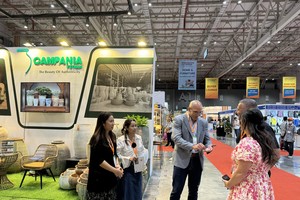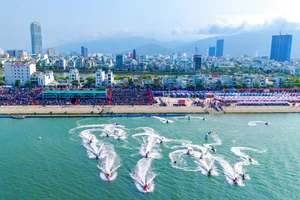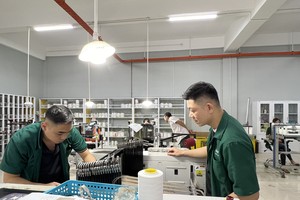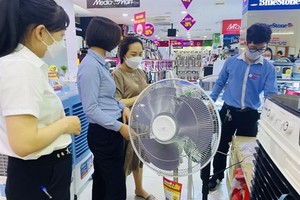 Workers of Saigon Aquatic Products Trading Joint Stock Company are provided stable accommodations to live and work at the factory. (Photo: SGGP)
Workers of Saigon Aquatic Products Trading Joint Stock Company are provided stable accommodations to live and work at the factory. (Photo: SGGP)
Active preparation
Mr. Truong Tien Dung, CEO of Saigon Aquatic Products Trading Joint Stock Company (APT), said that more than 400 workers of the company had been allocated stable accommodations to live and work at its factory. The company has requisitioned the entire facilities, such as offices, guest houses for experts, and executive offices, to provide workers with the safest, cleanest, and most convenient accommodations. Its workers are divided into two separate areas for male and female workers for convenience in daily life.
According to Mr. Dung, although the application of the new regulations on Covid-19 prevention and control issued by the municipal People's Committee is urgent, the company is not too passive because earlier, the Ministry of Health had recommended enterprises to implement the above solution.
Moreover, Bac Giang and Long An provinces had also deployed this solution. Its implementation to HCMC is only a matter of time. Therefore, enterprises actively prepared facilities in advance. The company also propagandized for workers to understand and encouraged them to participate since June this year, so workers have participated enthusiastically. This is extremely important, especially when the company produces essential goods, and must not interrupt the supply chain to the market.
Ms. Le Bich Loan, Deputy Director of the Management Board of the Saigon High-Tech Park, said that in the high-tech park, the work of guiding enterprises to implement production safety, including arranging concentrated accommodation for workers, has been implemented since June. Some enterprises with strong internal financial resources have actively contracted hotels and boarding houses to provide concentrated accommodations and transport workers. As soon as the city issued the regulations, 75 out of 85 enterprises met the standards of Covid-19 prevention.
However, besides these proactive enterprises, many businesses still cannot meet the conditions to implement Covid-19 prevention measures and are forced to close factories. Most of them are enterprises operating in the field of textile, garment, and footwear.
Mr. Pham Xuan Hong, Chairman of HCMC Association of Garments, Textiles, Embroidery, and Knitting, said that most textile enterprises had to halt operations. The reason is not that they are not proactive in the above situation, but because the number of workers is too large for them to ensure safe conditions and afford supportive costs. Currently, on average, each garment and footwear enterprise has 1,000 or tens of thousands of workers. It is extremely difficult for enterprises to have to arrange accommodation for such a large number of workers. Moreover, the profit margin of textile enterprises is thin, so they cannot cover additional expenses, such as accommodation and testing.
Hope to socialize Covid-19 testing
Acknowledging the actual preparation of enterprises for the new regulations on Covid-19 prevention, Mr. Pham Thanh Truc, Deputy Director of the HCMC Export Processing Zone and Industrial Park Authority (Hepza), said that besides many enterprises that had actively transformed to meet the new regulations, many other enterprises remained confused and unable to carry out solutions, facing the risk of closure.
Noticeably, from June this year, Hepza had notified and advised enterprises to prepare for production isolation to ensure Covid-19 prevention, but many enterprises neglected its advice. Currently, Hepza is striving to receive applications for registration and guide to create the most favorable conditions for businesses to provide accommodation for workers to stay at factories.
From another perspective, Ms. Le Bich Loan also emphasized that difficulties were not over for enterprises that met the current pandemic prevention standards. They have had to reduce capacity and increase labor costs. It was recorded that the production scale has decreased by 50-70 percent. Some factories even had to reduce their production capacity by 90 percent because they did not have insufficient facilities to arrange on-site accommodations for workers.
For example, Samsung Electronics Company reduced its production capacity by 50 percent, Intel Products Vietnam Company by 70 percent, and Jabil Vietnam Company by 90 percent. The larger the production scale, the higher the reduction in production capacity.
The implementation of the live-in at the factory will lead to increasing costs, mainly accommodation and Covid-19 testing costs. Many enterprises said that as their workers had been arranged to stay at the factories and could be supervised, Covid-19 testing frequency should be relaxed. In addition, it should socialize Covid-19 testing to reduce the time to wait for testing of workers, helping enterprises maintain continuous production. Moreover, many enterprises proposed that ministries and agencies need consistent direction to end the congestion of goods circulation in some provinces.
“More importantly, solutions, such as tax reduction, tax extension, and loan interest rate reduction for enterprises, should be implemented effectively, and administrative procedures must be simpler and quicker. As for enterprises, they will actively negotiate with partners to delay the delivery time, especially for export orders, to avoid the risk of contract compensation," added Mr. Truong Tien Dung.
Mr. Truong Tien Dung, CEO of Saigon Aquatic Products Trading Joint Stock Company (APT), said that more than 400 workers of the company had been allocated stable accommodations to live and work at its factory. The company has requisitioned the entire facilities, such as offices, guest houses for experts, and executive offices, to provide workers with the safest, cleanest, and most convenient accommodations. Its workers are divided into two separate areas for male and female workers for convenience in daily life.
According to Mr. Dung, although the application of the new regulations on Covid-19 prevention and control issued by the municipal People's Committee is urgent, the company is not too passive because earlier, the Ministry of Health had recommended enterprises to implement the above solution.
Moreover, Bac Giang and Long An provinces had also deployed this solution. Its implementation to HCMC is only a matter of time. Therefore, enterprises actively prepared facilities in advance. The company also propagandized for workers to understand and encouraged them to participate since June this year, so workers have participated enthusiastically. This is extremely important, especially when the company produces essential goods, and must not interrupt the supply chain to the market.
Ms. Le Bich Loan, Deputy Director of the Management Board of the Saigon High-Tech Park, said that in the high-tech park, the work of guiding enterprises to implement production safety, including arranging concentrated accommodation for workers, has been implemented since June. Some enterprises with strong internal financial resources have actively contracted hotels and boarding houses to provide concentrated accommodations and transport workers. As soon as the city issued the regulations, 75 out of 85 enterprises met the standards of Covid-19 prevention.
However, besides these proactive enterprises, many businesses still cannot meet the conditions to implement Covid-19 prevention measures and are forced to close factories. Most of them are enterprises operating in the field of textile, garment, and footwear.
Mr. Pham Xuan Hong, Chairman of HCMC Association of Garments, Textiles, Embroidery, and Knitting, said that most textile enterprises had to halt operations. The reason is not that they are not proactive in the above situation, but because the number of workers is too large for them to ensure safe conditions and afford supportive costs. Currently, on average, each garment and footwear enterprise has 1,000 or tens of thousands of workers. It is extremely difficult for enterprises to have to arrange accommodation for such a large number of workers. Moreover, the profit margin of textile enterprises is thin, so they cannot cover additional expenses, such as accommodation and testing.
Hope to socialize Covid-19 testing
Acknowledging the actual preparation of enterprises for the new regulations on Covid-19 prevention, Mr. Pham Thanh Truc, Deputy Director of the HCMC Export Processing Zone and Industrial Park Authority (Hepza), said that besides many enterprises that had actively transformed to meet the new regulations, many other enterprises remained confused and unable to carry out solutions, facing the risk of closure.
Noticeably, from June this year, Hepza had notified and advised enterprises to prepare for production isolation to ensure Covid-19 prevention, but many enterprises neglected its advice. Currently, Hepza is striving to receive applications for registration and guide to create the most favorable conditions for businesses to provide accommodation for workers to stay at factories.
From another perspective, Ms. Le Bich Loan also emphasized that difficulties were not over for enterprises that met the current pandemic prevention standards. They have had to reduce capacity and increase labor costs. It was recorded that the production scale has decreased by 50-70 percent. Some factories even had to reduce their production capacity by 90 percent because they did not have insufficient facilities to arrange on-site accommodations for workers.
For example, Samsung Electronics Company reduced its production capacity by 50 percent, Intel Products Vietnam Company by 70 percent, and Jabil Vietnam Company by 90 percent. The larger the production scale, the higher the reduction in production capacity.
The implementation of the live-in at the factory will lead to increasing costs, mainly accommodation and Covid-19 testing costs. Many enterprises said that as their workers had been arranged to stay at the factories and could be supervised, Covid-19 testing frequency should be relaxed. In addition, it should socialize Covid-19 testing to reduce the time to wait for testing of workers, helping enterprises maintain continuous production. Moreover, many enterprises proposed that ministries and agencies need consistent direction to end the congestion of goods circulation in some provinces.
“More importantly, solutions, such as tax reduction, tax extension, and loan interest rate reduction for enterprises, should be implemented effectively, and administrative procedures must be simpler and quicker. As for enterprises, they will actively negotiate with partners to delay the delivery time, especially for export orders, to avoid the risk of contract compensation," added Mr. Truong Tien Dung.
























